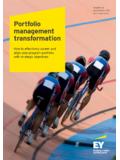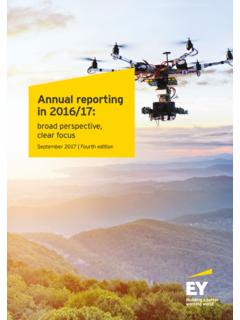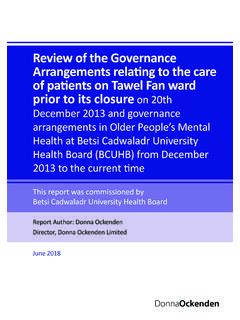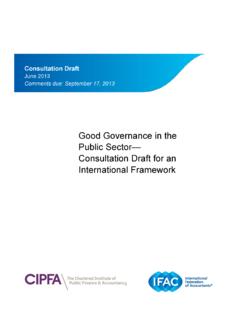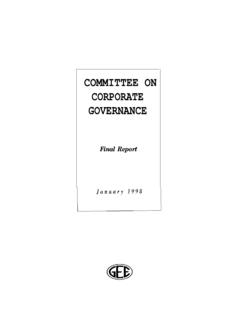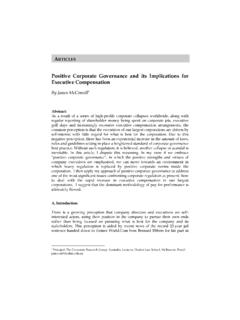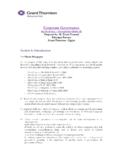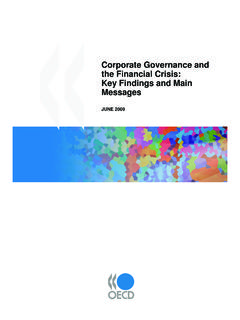Transcription of EY - Accelerating your financial close arrangements
1 Contents at a glanceLocal government accounting, auditing and governance preserving quality financial reporting in light of the new reporting timetableKey questions for the Audit CommitteeFind out moreAccelerating your financial close arrangementsEY Think Piece2 Accelerating your financial close arrangementsThe Government believes that this change will reduce the burden of the closure process, enabling finance staff to give more time to in-year financial management. This is the first of a series of briefings we will produce during the transition to the new financial reporting timetable. This briefing draws on our experience of working with clients who have successfully closed their accounts early and had their audit opinions issued by the end of July.
2 It also draws on discussions we have had with our clients at our recent Public Sector Accountants workshops and will highlight early areas of consideration that you can begin to think about. We will set out areas for consideration in how we can work together with you to meet the revised deadline for 2017/18 or sooner, as we think a trial run and review of the process in 2016/17, would pave the way for a successful outcome once the regulations are introduced formally a year second briefing, which will follow in early summer, will provide a more detailed analysis of how fit for purpose your financial reporting function is, and how you balance the speed of financial reporting, against the quality of financial reporting.
3 Accounting, auditing and governanceAccelerating your financial close arrangements for the new 2017/18 deadline, commencing the pathway to successIn our November 2014 briefing, we told you about the Government s consultation on the Local Audit Regulations associated with the Local Audit and Accountability Act. This consultation has now concluded, and on the 17 February 2015 the Accounts and Audit Regulations 2015 were laid before Parliament, having been made (signed by the Minister) under the Local Audit and Accountability Act 2014 on 12 February 2015. key area of the regulations is that from the 2017/18 financial year, the timetable for the preparation and approval of accounts will be brought forward to a draft accounts deadline of 31 May and an audit deadline of 31 July.
4 These changes provide challenges for both the preparers and the auditors of the financial statements. The impact of the changes to the deadlines and their impact is shown in the table deadline2017/18 deadlineReduction in timePreparation of draft financial statements, signed by s151 officer30 June31 May30 daysApproval and publication of financial statements with audit opinion30 September31 July62 daysAvailable audit time92 days 61 days31 daysEfficiency of financial reportingQuality of financial reportingSpeed of financial reportingEfficientHighInefficientPoorSlo wFa s tFit for purpose: re-shape, invest, or do nothing?Fit for purpose: need for quality, speed, or both?3 Accelerating your financial close arrangementsAccounting, auditing and governanceThe economic downturn, the impact of austerity on public sector funding levels, the increased demand for regulatory compliance, greater transparency over the use of public funds and now a faster reporting timetable is making the task of delivering on-time, high quality financial and non- financial information ever more challenging, for practitioners and good news is that with some planning, communication and joint working.
5 Those deadlines are highly attainable sixteen principal local government bodies received an unqualified audit opinion by 31 July 2014 and published their audited accounts promptly as reported in the Audit Commission s report Auditing the Accounts 2013/14: Local Government Bodies. The Audit Commission notes that the timely presentation of audited accounts with an unqualified audit opinion is fundamental to good governance . It indicates that bodies have sound financial management arrangements and is the main way that they account for their use of taxpayer s money. Therefore, making the year-end closedown routine part of that overall financial management of the Council is crucial to achieving the deadline, not having it as a bolt on exercise for Month 13 with a specific set of autonomous deadlines.
6 The omens are good, as the majority of Councils are on the right trajectory having met the current reporting deadlines consistently for the last few years, the challenge now is upping the speed of that trajectory to achieve the faster considerations for the preparers of the accounts and their auditorsAs with any project the key to success is in the planning, together with timely engagement and collaboration between the preparers of the financial statements and the auditors of those statements. We appreciate that each client starts from a slightly different base position. Therefore, there is no one size fits all solution. However, there are areas where consideration can be given now: Revisit the current project timetable.
7 Our clients who have been able to close early, place this success on the robustness of their project timetable and their understanding and management of bottlenecks and requirements for information from outside the finance how your current project timetable, where the bottlenecks are, and the critical path of the tasks required to meet the new deadlines will shape the areas of financial reporting that need the most attention. The earlier this is done, the greater scope there is to smooth the process and develop the capacity to deliver the key with your auditor, you can discuss and agree timings of the audit and build this into the overall plan, rather than run it as separate closedown and audit your financial close arrangementsAccounting, auditing and governance A n early in-year financial hard close .
8 A hard close provides the auditor with the opportunity to perform early substantive procedures, especially on the revenue side of the primary statements, and to bank audit assurance early in the process, thereby saving time in the tighter latter period. Typically auditors speak of a Month 9 hard close as being optimal in other sectors such as the NHS. But with Local Government responsibilities for setting Council Tax, authorities need to be mindful of their budget setting process and timetable. It may be that a Month 8 or Month 10 hard close would be better. What would work for your auditor? What are the barriers to doing an in-year hard close ? Does your finance team have the capacity to do this?
9 Is it possible to bring forward the process of setting the budget, to allow a Month 8 10 hard close to happen, without reducing capacity for other key finance responsibilities? There are examples of Councils having completed the budget review and setting process by late October subject to Member discussions and agreement before the end of November. This may be an enabler to performing a part-year hard close . Format of your accounts. Do you have any superfluous notes? How much detail do you provide? This is the quality aspect of financial reporting. Now is the time to streamline the content of your statements, and remove any notes that are not required (on the basis of materiality), and review accounting policies in light of those note changes.
10 In December 2013, CIPFA issued financial Statements: A Good Practice Guide for Local Authorities which included a chapter around materiality and clutter. This report highlighted two types of clutter identified by the financial Reporting Council in their report Cutting Clutter : Immaterial disclosure that inhibit the ability to identify and understand relevant information Explanatory foreword information that remains unchanged from year to yearRemember as the preparer of the statements, you must determine your own materiality level for inclusion of items in the accounts and this level may be different to that of your auditor. It is, as is a common theme here, appropriate to discuss what the auditor would consider materiality to be, so you can take an informed view.
